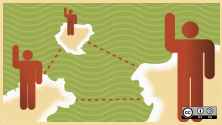The rise of microservices and containers have given birth to thousands of different open source projects. Many of them are hosted by the Cloud Native Computing Foundation (CNCF), with Kubernetes probably the best-known.
One of the easiest (read: best) ways to learn and be part of this exciting technology advance is to join a local Kubernetes meetup group. But what if there's not a Kubernetes meetup in your area? The answer is easy: start one.
Planning the first meetup
-
First things first: Check if there's already a CNCF meetup group in your area.
-
Find a speaker or volunteer to give a talk. See below for some ideas on getting speakers.
-
Find a sponsor and venue. It's not as difficult as it sounds—a lot of companies will be happy to host your group.
-
Register with Meetup.com and start promoting your event there, as well as on Twitter, LinkedIn, and other local outlets.
-
You can also promote within the community on Slack: either at the #events channel for Kubernetes or the #community channel for other CNCF projects.
This should be enough to get started and register the new meetup group with CNCF. However, growing a community is a marathon, not a sprint, and you'll need both time and patience.
Tips for finding speakers
Finding great speakers is the most difficult part and requires some effort and a bit of luck.
-
Remember that the speaker's abstract, title, and bio are important to attract people to your event.
-
You can use a Google Docs form, like one from the Dallas Kubernetes meetup group, to help potential speakers reach you. (Feel free to can copy and modify that Doc.)
-
Consider joining other meetups and other local or regional events and conferences to bring in national speakers.
-
Check CNCF's speaker's bureau for qualified speakers.
Other helpful hints
Here are some other general tips for organizing any type of meetup.
-
It's better to schedule events on Tuesday, Wednesday, or Thursday after 6pm.
-
Labs and hands-on sessions are the most popular types of events.
-
Joint events help increase attendance, so try to collaborate with other meetup groups when you can.
-
Share slides and recordings whenever possible.
-
Overbooking the room capacity is OK; at least a third of registered participants don't show up due to traffic and changes of plans.
-
Things break and sometimes they break at unfortunate times. To help reduce your risk, check your projector and other equipment a day or two before the meetup. Having a spare meeting room might save the day.
-
WiFi, pizza, and drinks are vital and shouldn't be ignored.
-
If you have budget to spare, order some swag to give away. Check out CNCF's store for some ideas.
-
Always remember (and never forget) the CNCF Code of Conduct. There's nothing surprising there: we all aim at creating an inclusive and welcoming environment for every participant.
-
Last but not the least: remember to have fun!
If you'd like more ideas for organizing a Kubernetes meetup, watch the panel discussion Community Building from Scratch: Sharing Experience of CNCF and K8s Meetups recorded in December at KubeCon + CloudNativeCon North America 2018.







Comments are closed.